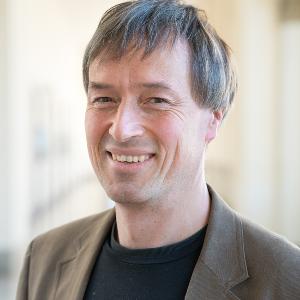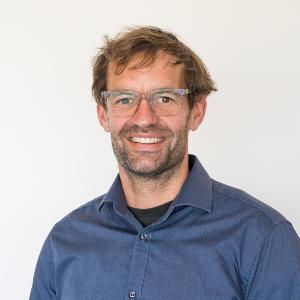Two LMU researchers awarded HFSP grants
21 Apr 2023
Dieter Braun and Christof Osman, together with international partners, have each received funding worth around a million euros from the Human Frontier Science Program.
21 Apr 2023
Dieter Braun and Christof Osman, together with international partners, have each received funding worth around a million euros from the Human Frontier Science Program.
Evolution of the first cells and cellular aging processes – these are the subjects of two large-scale interdisciplinary projects for which LMU physicist Prof. Dieter Braun and Prof. Christof Osman from the LMU Biocenter have received a prestigious research grant from the international Human Frontier Science Program (HFSP). The funding totals around a million euros for each project.

Prof. Dr. Dieter Braun | © Christoph Hohmann
As head of the project “Autonomous evolution of synthetic cells under non-equilibrium conditions,” biophysicist Dieter Braun will investigate the evolution of cells in conjunction with Kerstin Göpfrich (Max Planck Institute for Medical Research in Heidelberg) and Tomoaki Matsuura (Earth-Life Science Institute, Tokyo Institute of Technology). First, the researchers will seek to understand how protocells originated in the course of Earth’s history. Building on this, the team will then experimentally monitor for the first time how such synthetic protocells develop in a state of non-equilibrium. This Darwinian evolution will run without the intervention of the researchers.
The team is pursuing the idea that the complexity of molecular and cellular systems developed almost necessarily out of simpler systems. “In all these hierarchical steps, we’re trying to trigger evolutionary steps through physical processes,” says LMU biophysicist Dieter Braun. “The emergence of a cellular phenotype elevated the efficiency of Darwinian evolution to a new plane – but it remains uncertain how such cellular evolution could have developed by itself.”
In the experiment, the researchers want to observe the developing functionality of biomolecules in protocells. The mechanism as a whole encompasses the reproduction of genetic information, the concentration of biomolecules, and the formation of cell compartments, so-called vesicles. In a microfluidic flow system, the system of synthetic cells is brought into non-equilibrium conditions by means of heating and cooling or freezing and thawing. The goal is to understand how functional complexity incrementally emerges in these cells.
Prof. Dieter Braun has been Professor of Systems Biophysics at LMU since 2007. In 2018, the European Research Council (ERC) awarded him an Advanced Grant. Since 2018, he has also been spokesperson of the “Emergence of Life” Collaborative Research Centre supported by the German Research Foundation (DFG).

Prof. Dr. Christoph Osman | © Carolin Bleese
As head of the “Intracellular selection and dynamics of mitochondrial ageing” project, cell biologist Christof Osman will investigate the decline in mitochondrial function during the aging process in conjunction with Prof. Michael Krieg (Institute of Photonic Sciences (ICFO) in Barcelona) and Prof. Boris Shraiman (University of California , Santa Barbara). Mitochondria are cellular organelles that are responsible for supplying energy to cells. They possess their own genetic substance called mtDNA. As mutations in mtDNA are associated with various diseases and the aging process, it is important to understand age-related mtDNA changes.
The team plans to use fluorescence microscopy on living cells along with optical and microfluidic instruments in order to monitor mtDNA-related changes in the model organism – baker’s yeast – during the lifetime of individual cells. The researchers will quantitatively analyze the resulting data with the aid of mathematical models in order to discover processes and mechanisms that are involved in the breakdown or maintenance of mtDNA integrity during the aging process.
“Because age-related mtDNA disintegration is widespread in organisms from yeast to humans, our project promises far-reaching fundamental insights into the mechanisms that affect our aging process,” says Osman. “Our results could potentially contribute to the development of new kinds of therapeutic interventions for age-related diseases.”
Prof. Dr. Christof Osman completed his doctoral studies in Cologne in 2008, having studied biology in Bonn and Cologne. After working as a postdoc at the University of California, San Francisco, he has been Professor of Cell Biology at LMU since 2017.
The international Human Frontier Science Program promotes novel, innovative and interdisciplinary basic research that investigates the complex mechanisms of living organisms. Projects must include researchers from at least two different countries. The program is supported by numerous national states and the European Union. The grants are very competitive, with only around six percent of applicants successful this year.